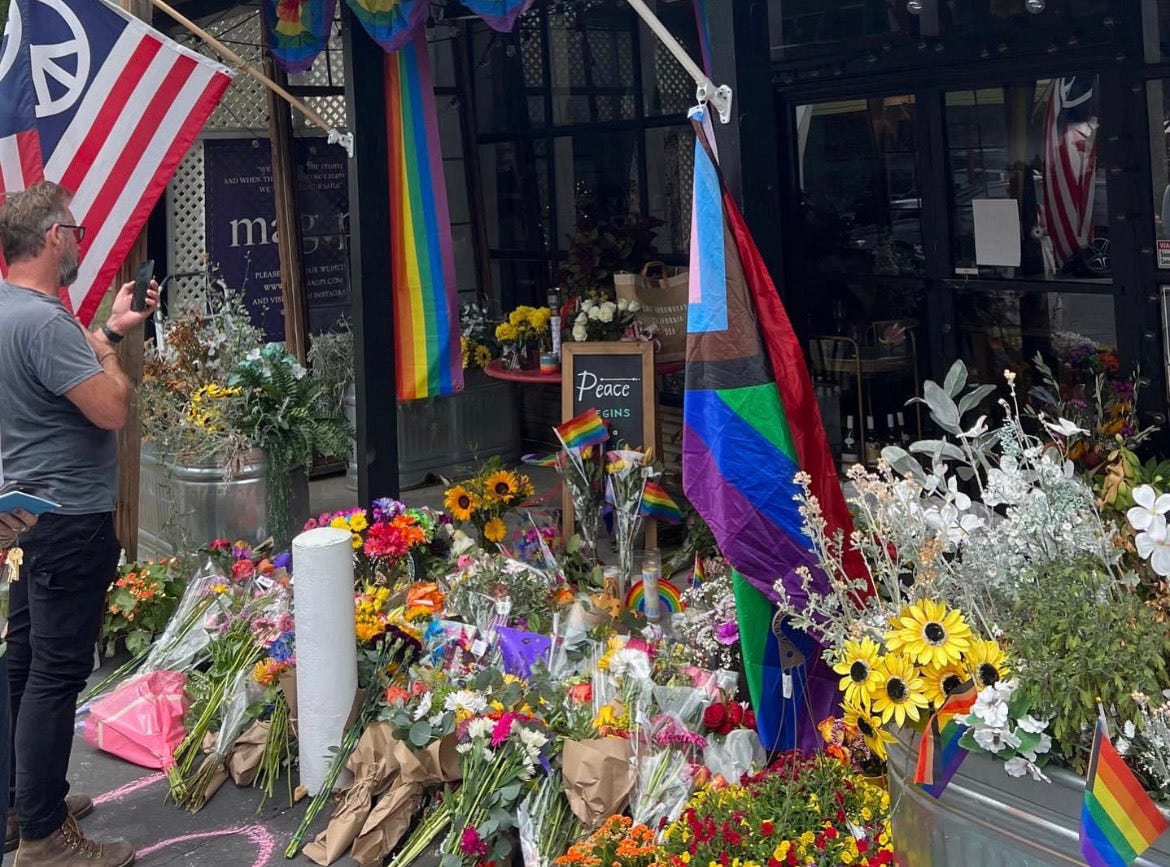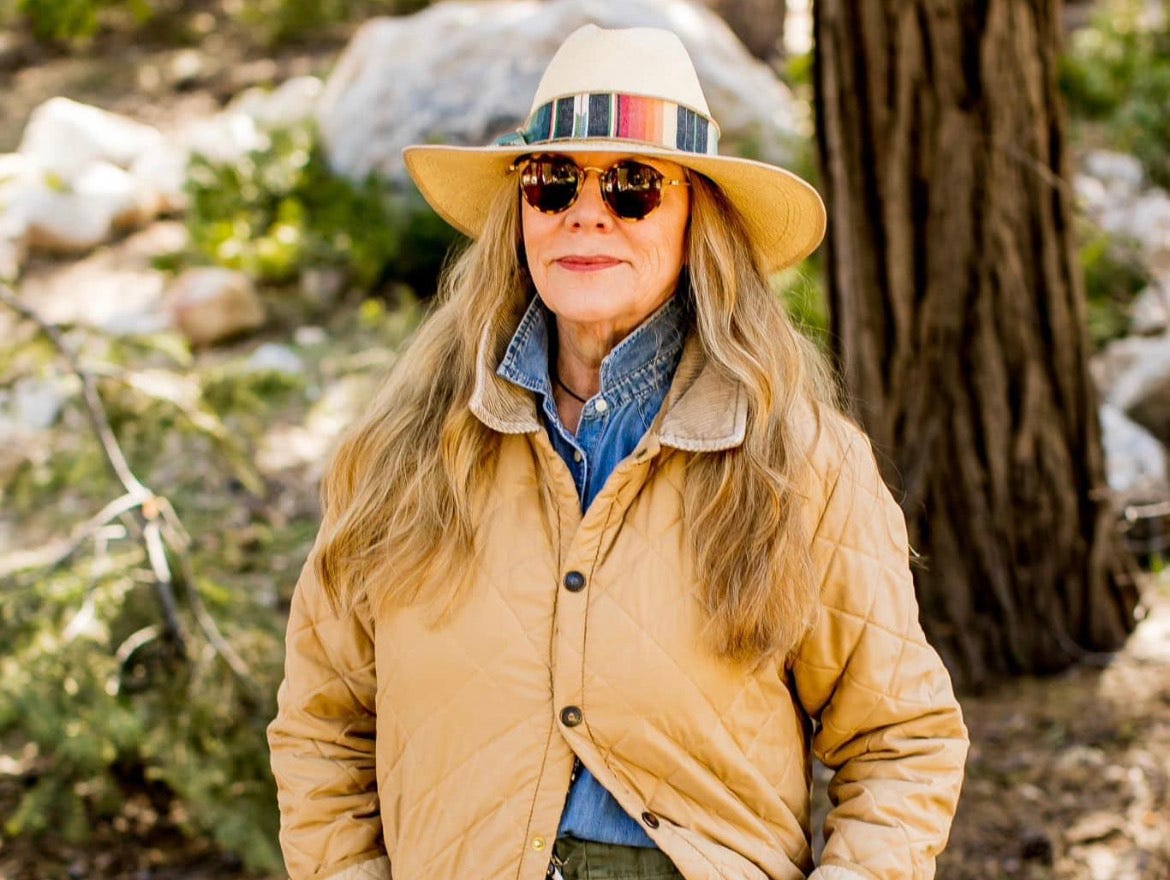lauri carleton showed us what true queer allyship looks like.
We owe it to the late California shop owner’s legacy to push harder for a better world.

Queering the Burbs is a regularly-published distillation of pop culture, politics and queerness written by Joe Erbentraut. If you like what you see, please consider subscribing (it’s free!), liking or sharing this piece.
I didn’t know Lauri Carleton, but I sure wish that I had.
Carleton, a 66-year-old Cedar Glen, California clothing boutique owner, was fatally shot inside her shop by a man in his 20s while in the midst of a heated discussion that ensued after he tore down the Pride flag that flew outside of her business, a shop called Mag.Pi, last week. The final words she spoke as she confronted this man, according to her close friend Paul Feig, were “Why do you need to do this?”
In the days that have passed, the world has come to know a lot about Carleton. She was a mother of nine children. She has been described as a pillar of her community and a staunch LGBTQ+ advocate and supporter, despite not being queer herself. She was a founding member of the Mountain Provisions Cooperative, which works to improve community access to affordable, healthy food. Her daughter, Ari, told CNN that her mother preached “love, acceptance, and equality” and that’s why she flew a Pride flag outside of her shop.
According to reports, Carleton had been confronted about her shop’s Pride flag before, and it had been taken multiple times before, too. Each time it was snatched, Carleton replaced it with a bigger one. Just before her death she had already ordered a new Pride flag because she felt the current one had grown too faded by the sun.
“I know that she passed standing up for something that she believed in,” Ari told CNN this week. “She was so fearless, and any negative reaction she just powered through.”
Carleton’s death is yet another startling reminder of how high the stakes are for LGBTQ+ people in this country right now. Last month, we learned of 28-year-old O’Shae Sibley, a professional dancer fatally stabbed during a horrific attack outside a Brooklyn gas station. And this year, we’ve seen a seemingly endless stream of anti-trans and anti-LGBTQ+ legislation proposed (and in many cases successfully signed into law) in statehouses across the country.
Moments like this should also remind us of the stakes of LGBTQ+ allyship. True allyship isn’t always an easy road. It’s not about being the world’s biggest RuPaul’s Drag Race fan or listening to Sam Smith or even having a gay friend or five. True allyship means showing up and standing up for queer communities even when (especially when) it is not convenient or popular.
True allyship can take many forms, and the form it took in Carleton’s life work is a prime example of that. She flew the Pride flag year round and did not cave to community pressure to tone down her advocacy because it was making some bigots uncomfortable. She volunteered her time, her money, and energy to community-led efforts like the work of Lake Arrowhead LGBTQ+ to bring about further understanding and acceptance of queer communities. (You can also support this ongoing work right now by donating to this nonprofit’s new Lauri Carleton Memorial Fund.)
A Pride flag is far more impactful and valuable than the fabric that it is crafted from. A flag like what Carleton flew outside her business every day communicates to queer people that they have a place in your community and in this world. It communicates without words that you see us, support us, and want to see us continue to survive and thrive. It is an act of solidarity with those of us within the community who display a Pride flag on our homes and businesses, even when this makes us subject to being targeted by hateful individuals.
Writer Allison Hope explained this better than I could in a new op-ed for CNN:
“A Pride flag is a tremendous symbol during an exigent time. It’s a way to signal to a young LGBTQ person, who might be bullied at school or rejected at home, that his life is worth something. It’s a sign to new residents, who may feel alone or unsure in an unfamiliar place, this can feel like home. … The Pride flag is not merely a frivolous adornment; it is a concrete and powerful marker that we don’t bow down to bullies; that we are principled and have integrity and are willing to stand up for what’s right and just. It’s a symbol of hope and promise that all are welcome here, even if we still aren’t welcome everywhere. We know the power of the Pride flag because those who aim to dehumanize us have tried to take it away.”
So, if you ever wonder why your friendly neighborhood queer person is sounding the alarm over a sudden reduction in the number of Pride flags around town during Pride Month, all of this is why. Actions like putting up a Pride flag might feel trivial to some. But is keeping queer people (especially queer young people) alive trivial? People like Carleton help queer people alive, and will continue to do so. Now it’s up to all of us to follow her example and honor her legacy by getting louder and braver.
There are some very impactful and actionable ways to do just that locally, as well. As just a few examples, Slo’ Mo and Kido are co-hosting a massive free Queer Fam Pride Jam at the Salt Shed in Chicago next Sunday. You can help the organizers spread the word about this amazing event by sharing this Instagram post to your IG stories, or even RSVP and attend yourself. There will even be house dance lessons and a skateboard school! Youth Outlook is also currently looking for volunteers for its drop-in centers, including virtual opportunities.
As a quick programming note, Queering the Burbs is currently a monthly offering featuring the voices of individuals who are doing cool queer shit out here in these suburban streets. You’ll also see additional essays like this one on occasion—when inspiration strikes, a community emergency occurs, or (in this case) both. I think it is critically important to document our community’s perspectives on and responses to the current reality. Your support—via liking and sharing essays like these and encouraging anyone you think would enjoy them to read and subscribe—is so appreciated.
Speaking of the above comments on allyship, we have to talk about self-professed “gay icon” Róisín Murphy. The former Moloko singer (whom I’ve frequently featured in this newsletter) recently appeared to express extremely problematic (and TERF-y) views on trans youth using hormone blockers via a series of Facebook comments and seemingly doubled down on the comments by pinning a comment from an account expressing anti-trans views to her most recent Instagram post (though the comment was later un-pinned).
Just to be very clear, if your support of queer people does not extend to trans and nonbinary folks, you are not a true ally to our communities. If you have questions or concerns about gender-affirming healthcare for trans and gender non-conforming youth and adults, I urge you to seek out what actual medical professionals like the AMA and the Association of American Medical Colleges, as well as the scientific community. Do your homework relying on reputable sources and do not rely on trans and nonbinary folks themselves to educate you. Put simply, gender-affirming care saves lives, and to openly and proudly state misinformation to the contrary is contributing to an environment in this country and world that makes it increasingly dangerous to be publicly queer and trans.
If you’re looking for something to listen to fill the Róisín-sized hole in your Spotify playlist of disco ball-ready dance bops, I’ll leave you with one of my favorite tracks of all-time, Hercules & Love Affair’s “Blind” featuring vocals from the incredibly icon trans singer-songwriter Anohni. It’s got a real dancing-at-the-end-of-the-world vibe that feels appropriate for the moment.
If you’re looking for more, my friend Ryan has also compiled this Spotify playlist which features 22 hours of amazing music from trans artists.




